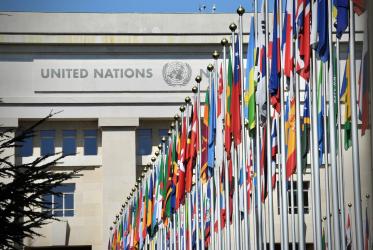Free photos available, see below
The government of Uruguay should implement the necessary measures to enact article fourth of the so-called Expiry Law of the Punitive Powers of the State which mandates the executive branch to investigate what happened to the disappeared. This was the central message that World Council of Churches (WCC) general gecretary Rev. Dr Samuel Kobia offered authorities during his visit to this country November 17-18.
"Knowing the truth about human rights violations is one of the essential elements to come to terms with the past and establish the foundation for a possible reconciliation," said Kobia when he met with vice president-elect senator Rodolfo Nin Novoa and with thel mayor of Montevideo Mariano Arana Sanchez.
At both meetings, Kobia affirmed the need to create a strong investigative commission, with the necessary powers and resources to carry out its task. With his comments, the WCC general secretary supported one of the demands of the Mothers and Relatives of Detained-Disappeared Uruguayans, with whom he met at the beginning of his visit.
Both Nin Novoa and Arana Sanchez agreed that families have a right to know the fate of their loved ones. They also voiced the willingness of the new government, which will take office March 1, 2005, to enact the legal disposition, although they recognized that it will not be an easy task.
The so-called Expiry Law of the Punitive Powers of the State, approved by a grassroots referendum in 1986, bars the state from legally persecuting those responsible for human rights violations committed during the military dictatorship that governed the country between 1973 and 1985. The fourth article, however, did mandate the executive branch with investigating what happened with the disappeared, but it has not yet been implemented.
During the meeting with representatives from the Mothers and Relatives organization, Kobia committed the WCC to lobbying for truth and justice with authorities, as well as to support work being carried out at the United Nations to define a convention on forced disappearances.
Kobia's visit to Uruguay also included meetings with representatives of WCC member churches and other churches and faith communities, as well as ecumenical organizations. In Montevideo, the WCC general secretary participated in an ecumenical celebration at the Methodist Church and offered the sermon.
During a visit to Colonia Valdense, some 120 kilometres from the capital city of Montevideo, Kobia had the opportunity to meet with members of a local Waldensian congregation as well as other churches, and to dialogue about the current ecumenical scene. He also visited the Emmanuel Centre, an ecumenical training and events facility that includes an ecological farm.
Free high resolution photos are available in:






